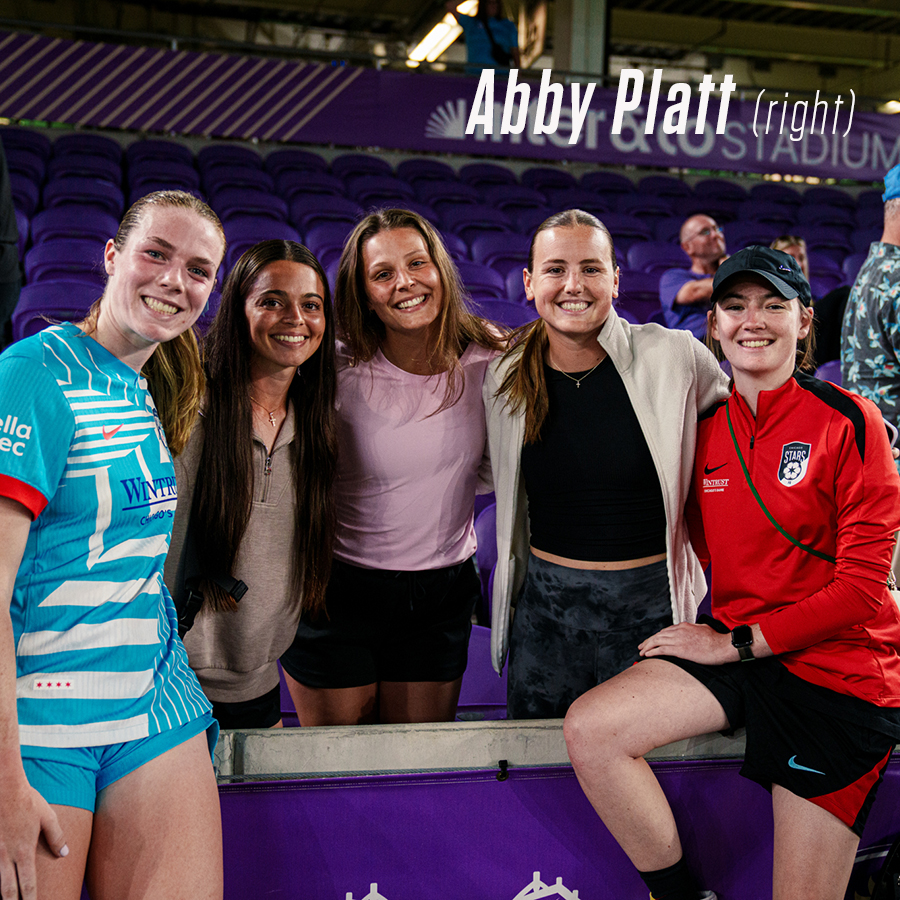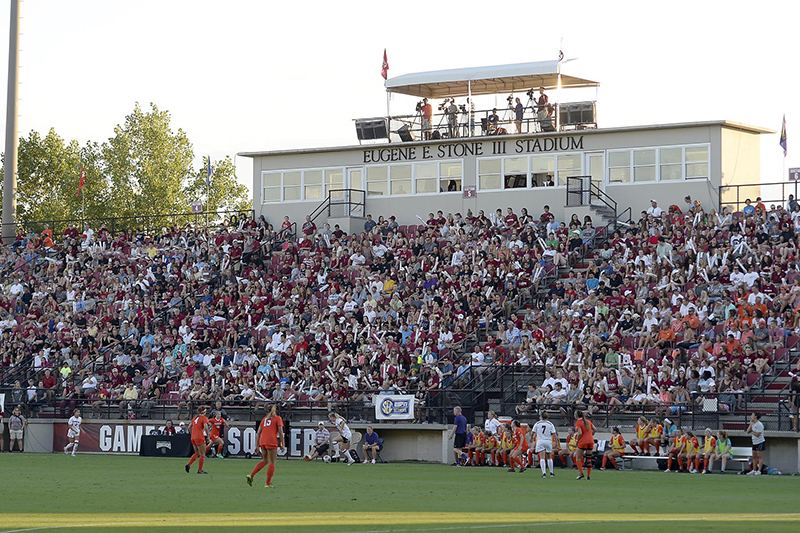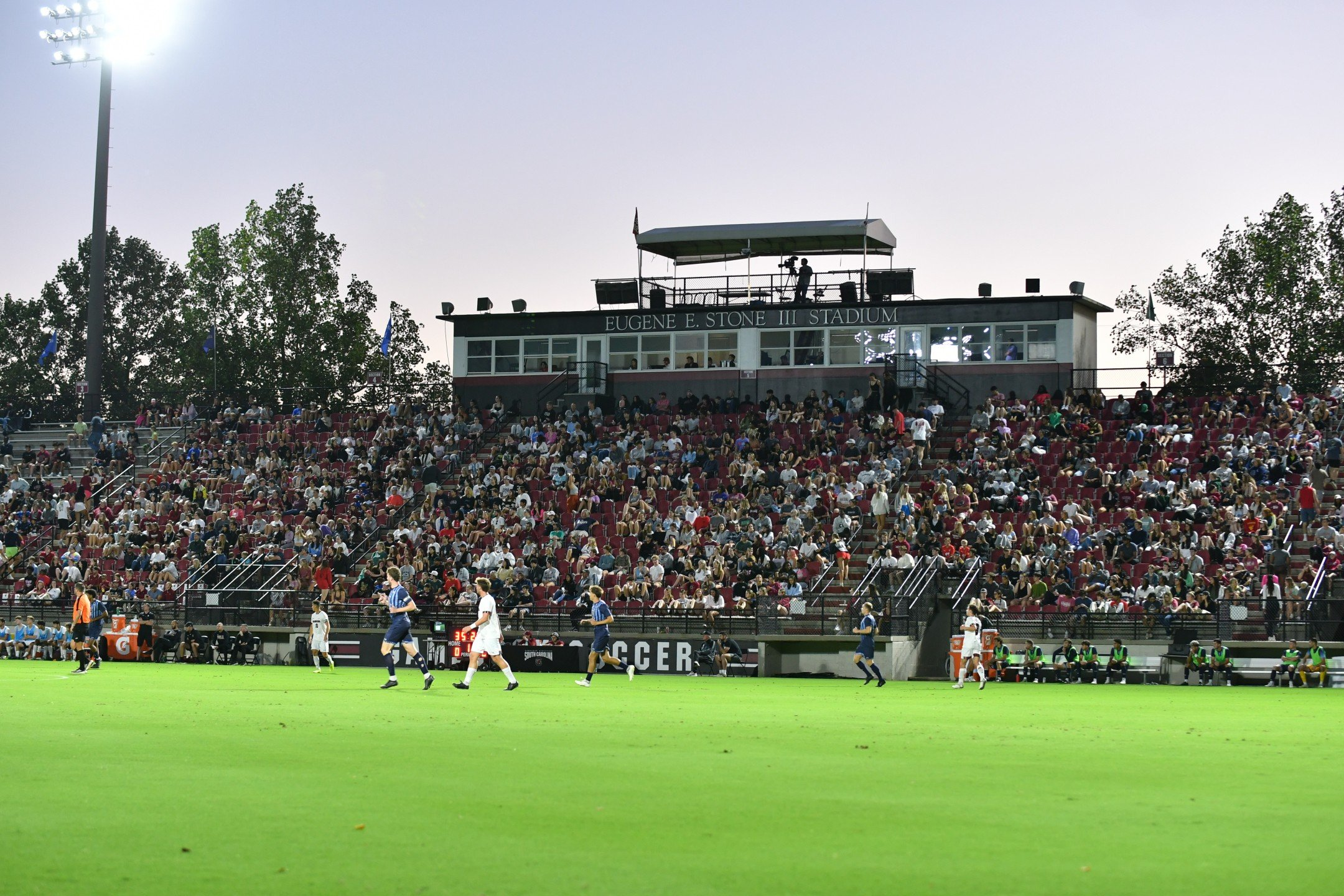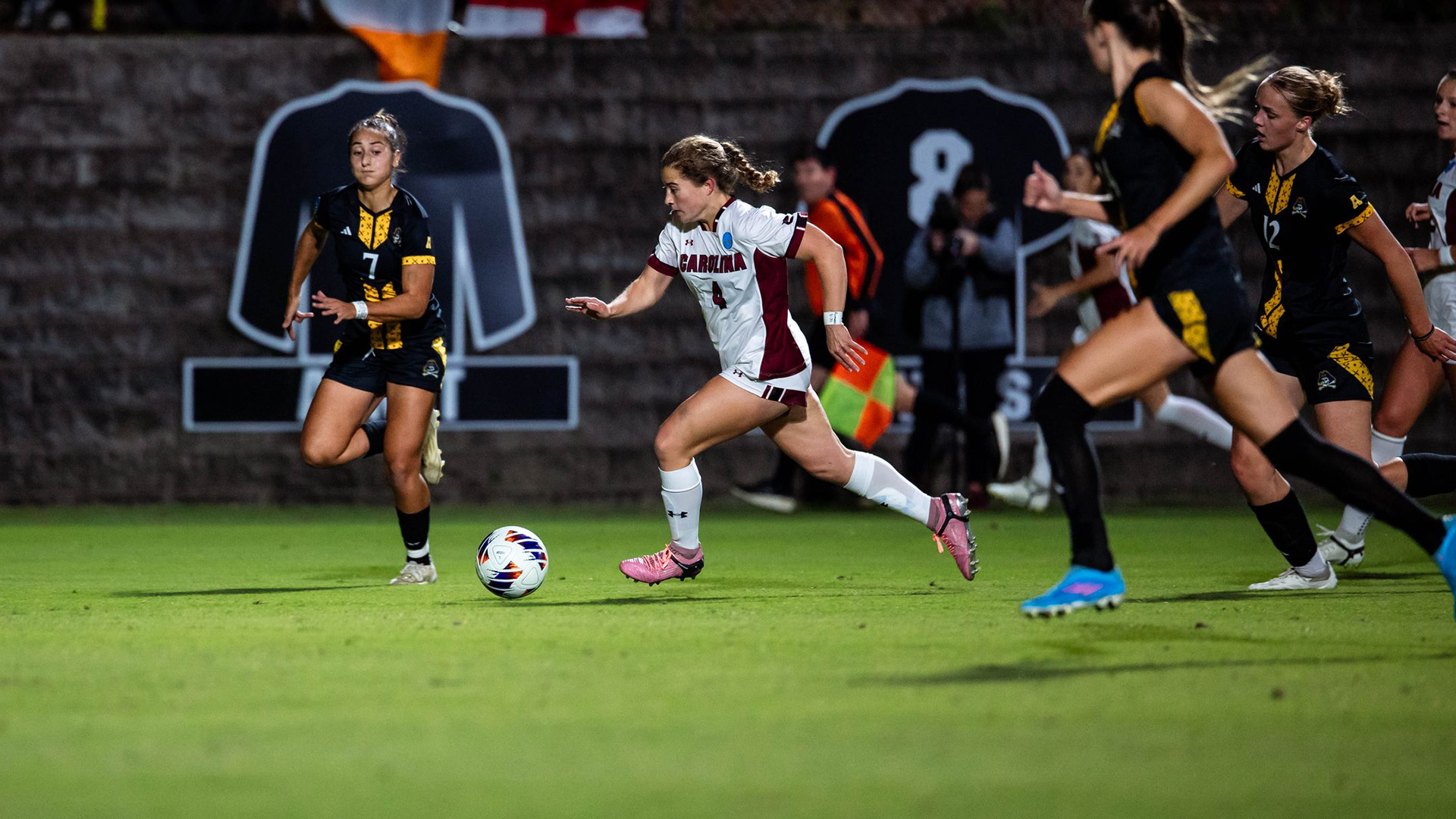Pipeline to Success for Former Women's Soccer Managers
While being a collegiate student-athlete can you set you up for professional life off the playing field, the same can be said by a different form of participation in the athletics realm. Former South Carolina women’s soccer student managers are finding success in the professional world thanks to their education and experiences behind the scenes of the Gamecock teams.
“I thought being around sports is something I wanted to do, and I thought it would stand out on a resume in being able to relate to athletes from a non-athlete standpoint,” said Kheron Alston (pictured above) a 2021 broadcast journalism graduate who is currently a Communications Specialist at the Baltimore County Health Department in Maryland after serving as a manager from 2019 through 2021. Prior to that, he was a TV sports and news anchor and reporter in West Virginia. “It helped me in being able to talk to athletes. I knew I wanted to work in sports and thought about being a Sports Information Director. So, I helped out with that as well. Building those relationships helped me out as a sports reporter.”
“I grew up playing soccer but was not good enough to play at the college level and I knew I wanted to stay around sports,” said Sarah Kanuch, head equipment manager for the NWSL’s Racing Louisville and was a manager at South Carolina from the spring of 2017 through fall of 2019 before graduating in 2020 with a degree in sport and entertainment management. “I enjoyed being around the team every day. You’re as involved as the players without playing. It’s just a different side of it.”
“It was my first taste of the sports world and where I found a passion for it, and combined that with my passion for design,” said Katie Denson, who is a graphic designer for the Charlotte Hornets after serving as a manager for the Gamecocks in the spring of 2021 and earning her degree in graphic design. “It made me realize what I wanted to do when I graduated. All of the coaches were all-in with helping me to create a good experience and tailor it to what I wanted to get out of it. It was the first time I was able to apply the things I learned in school with a real-world experience.”
“I loved photography, and I didn’t know that you could do that and combine it with my interest in sports,” said Caroline Barry, who is currently the Assistant Director for Digital Marketing at Quinnipiac University in Connecticut after serving as a manager for the Gamecocks from 2021 through 2023. She earned her undergraduate degree in visual communications in 2022 and a master’s in mass communications and multimedia journalism in 2023. Her sister, Cat, recently graduated and was South Carolina’s all-time leading goal scorer. “When I got this opportunity, it totally changed the path for my career. Plus, having the connection with my sister in the program, it became one of the most amazing opportunities I could have imagined.”

“I became a manager as a part of an internship for my final semester,” said Nan Hubright, who is an events graphic designer at Quint, a sports and live entertainment event company. She graduated in the spring of 2022 after studying graphic design. “The most helpful part was learning the culture of the sport and working in sports from a creative standpoint. So, what I do now is hospitality events for Formula 1, the NBA, the WNBA, and we just did the Kentucky Derby. I make assets for each of the races for Formula 1. I do credentials and walking maps or anything that will help the guests have a really good experience and make it worth the money that they’re paying for having an elevated experience besides just sitting in the grandstand.”
“I had a really bad injury as a sophomore in high school and knew I wasn’t going to be able to play in college. I knew I wanted to work in women’s soccer professionally, and I reached out to the coaches when I committed to South Carolina,” said Abby Platt, who is currently an assistant equipment manager for the Chicago Stars FC of the NWSL. She graduated in the spring of 2024 with a degree in sport and entertainment management after serving as a manager for the Gamecocks from 2020 through 2023. “I started working with training and got more and more responsibilities after that. Everything that I was able to do in college almost directly translated into my current role. Very few people coming out of college have that experience going into the professional side and that led to my getting the job here in Chicago.”
Being a student manager on a collegiate soccer team is not a one-size-fits-all occupation.
“I was taking pictures and doing some social media graphics, but mostly I was creating content,” Hubright said. “I learned a lot about the demands of working in such a cool field.”

“I did a little bit of everything,” Alston said. “I set up drills for practice, handled a lot of the away game stuff like organizing the uniforms, packing up all the cones and soccer balls, getting players the socks and cleats they wanted, and a lot of pregame and postgame stuff with their meals.”
“I was pretty much the team photographer for two years,” Barry said. “I traveled with them occasionally. It gave me a lot of creative freedom, I did a lot of graphics work, I designed t-shirts, and I helped out at clinics. I had a lot of experiences beyond what I thought I wanted to do and helped my career path evolve.”
For the former managers, even if they weren’t going to work in sports after college, the experience helped set them up for success.
“Having it on my resume that I worked at South Carolina gave me that foot in the door,” Kanuch said. “It’s a lot of the same work, but as you move up you get more responsibilities. It laid the groundwork of the day to day for what my job now is. I love it. I’m around the team every day, I get to travel, and it’s not a desk job.”
“I would go to all of the early morning practices, and we had late nights on game nights, and then had to create social media content after the game,” Denson said. “That taught me how the sports industry is such a unique work environment. It’s not always nine-to-five. I never would have known that without this experience at South Carolina. It helped me mentally prepare for what was to come.”

“It definitely helped me realize more how much goes into running a training sessions,” Platt said. “From a players side, you show up and things are already set for you. When you’re done, you just head out. When you’re on the operations side, you’re coming in three or four hours early to make sure everything is set up and waiting for the players to come in and knowing during warm ups you have to get everything off the field and clean it up so the game can start on time, especially at the professional level where you can get fined over things like that. You learned how to communicate with coaches in what their needs were in a professional setting. It gave me a more well-rounded view of what goes into a match day.”
“It brought a lot of structure to me with having to be on schedule,” Alston said. “Having that structure helped me when I advanced into the real world. Now, if it’s a three o’clock meeting, I’m not going to be there at three on the dot. I’m going to get there at 2:50. It helped me to look and plan ahead.”
“Looking back now, it changed my life more than I thought it would,” said Barry. “I started at Quinnipiac in April of last year after working with the New England Revolution in MLS the year before that. Working with South Carolina helped me get that foot in the door. It set me up well to learn how to work with a team. It pushed me to want to be a lot better because my stuff was going on South Carolina Women’s Soccer’s Instagram account, and they had like 20,000 followers. It forced me to grow fast and sharpen my skills in a short time.”
“One of the other great things about the student manager program is that I’m close with a lot of the other managers who worked at South Carolina, and we all still have these connections. We’ve all been able to help each other out to a certain extent, so that’s another great part of it.”













